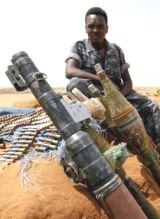Darfur displaced say “security” locks them in
By Opheera McDoom
ZALINGEI, Sudan, Sept 17 (Reuters) – Sudanese villagers who fled their homes in their thousands feel virtual prisoners in the Zalingei camp in Darfur, where they had hoped to find food and shelter.
 Sudanese army bases on small hilltops surround the camp in West Darfur state, but residents say they are there to keep them in, not to protect them from attacks.
Sudanese army bases on small hilltops surround the camp in West Darfur state, but residents say they are there to keep them in, not to protect them from attacks.
“They are here to control the camp rather than to protect them,” one U.N. official agreed.
A 19-month-old rebellion has driven 1.5 million people from their homes, with 200,000 refugees encamped in neighbouring Chad, creating what the U.N. calls one of the world’s worst humanitarian crises.
Jason Azevedo, an International Rescue Committee official, said there were just 24 police in total in the two main camps in Zalingei, with some 60,000 internally displaced people in the area.
But there was plenty of “security”. A vanload of security men followed journalists around the camp, and aid workers said people were often rounded up and questioned or intimidated for talking to foreigners.
As a crowd gathered to say goodbye to visitors, an army truck, with a soldier manning a large machine gun behind, drove into the crowd to push them back from danger as the helicopter took off.
One local tribal leader in the camp, who declined to give his name, said just the previous night, a few of the leaders were taken in and told by security not to talk to foreigners.
“They said, don’t talk to all the people who come,” he said. He added that armed men launched attacks in the camps.
“We don’t know who they are but they are armed, so they are not from the camps,” he said. He added the army did not stop them coming in.
POOR SANITATION KILLS
Azevedo said he had not heard of attacks in the camps, but there had been reports of women being raped as they leave to get firewood as recently as last week. He said the people did not trust the few police who were there.
But the biggest problem in the camp was sanitation. Another local leader, Sheikh Hussein Adam Juma’a, pointed out a graveyard for those who died in the camps of disease. It was surrounded by human faeces and an open cess pool.
“Someone dies every day or two, and we bury them here, as well as other places,” he said.
Azevedo said about three to four people died every week mostly from malaria and water-borne diseases such as typhoid.
“Sanitation is very poor. We need more latrines,” he said. A wake was being held for someone who had died, in the Muslim tradition of two days of recitation. Residents of the camps in Zalingei are all from ethnically African tribes and are Muslim.
After years of skirmishes between African farmers and Arab nomads over scarce resources in arid Darfur, rebels took up arms last year accusing Khartoum of supporting Arab militias, known as Janjaweed, to loot and burn African villages.
The government denies the charge and calls the Janjaweed outlaws.
In the area around Zalengei, about eight villages had been burnt and were deserted, save for a flock of white birds and a lonely cattle herder on foot. Within the blackened shells of the mud-brick huts, burnt out and rusted pots and pans lay on their side, hurriedly left behind by the residents.
There was no evidence of bombing in the villages, whose inhabitants now squatted in squalid camps a few kilometres away.
Aid workers said the major influx of people to Zalingei came two months ago, with far fewer since then and no new registrations in the past two weeks.
